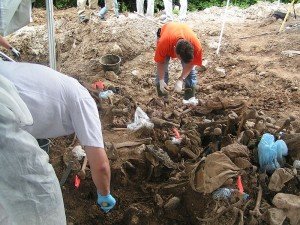International forum for mass grave victim identification
13th March 2013
The Royal College of Pathologists, London, UK

This event has CPD accreditation and is part of the Forensic Forums 2013 series – www.forensicforums2013.com
Event Web site: www.regonline.co.uk/grave2013
Talks include:
Roxana Ferllini, Coordinator Forensic Archaeological Science programme Institute of Archaeology, University College London
The investigation of human rights abuses is multi-faceted, with a principal objective remaining, among other goals, positive identifications of the victims. Approaches which are selected during the said process may vary, depending upon the nature of the enquiry in question; that is, some being formally arranged in preparation for judicial proceedings, whilst others, due to historical and political contexts, remaining within the context of a more direct humanitarian approach without legal ramifications.
The dead are always here: mass grave victims as social actors
Caroline Bennett, School of Anthropology and Conservation, University of Kent
Mass graves are often assumed to be negative spaces and the bodies they contain to be victims in need of individual identification and repatriation or reconciliation of one form or another. However, local concepts of the graves the bodies they contain vary dramatically even within the same country. Drawing on fieldwork from Iraq and Cambodia, this talk will explore local perceptions of mass graves and the bodies they contain, and ultimately ask the question: where does identity lie and who is investigation really for?
The Diplomacy of Mass Grave Investigations - Operating in Post Conflict Zoones
Roland Wessling, Cranfield University, UK
Mass fatalities, such as genocide, mass murder or other crimes against humanity, always leave a countries or regions in a state of post-conflict devastation and often lead to the existence of mass graves. When a certain level of normality has been established and the crucial three criteria a) security, b) political will and c) funding, is in place, the mass fatality can be investigated. Alongside the criminal investigation, forensic teams can support the legal cases by excavating graves, which also assists the humanitarian effort of repatriating the victims. These forensic investigations are often carried out by international or at least foreign teams. And they have to operate in a country or region, in which most of the reasons for the previous conflict are still present. The absence of war does not mean piece!















Follow Us!